Jun. 17, 2020
Summary
- The spread of Covid-19 caused sudden changes to the way many people in Japan work, with men being no exception.
- In particular, 60% of men in their child-rearing years who started teleworking following the spread of Covid-19 responded that it became easier for them to balance childcare and work, and half said that the time they actually spend on housework and childcare increased.
- If work styles incorporating telework become the norm among both men and women, making it easier for many men to secure time for housework and childcare while working even after schools, daycare centers, and after-school centers start to reopen, women in their child-rearing years will be able to engage more actively in the workforce. This could improve the productivity of society as a whole.
- When discussing post-Corona work styles, we must consider increasing the productivity of society as a whole.
The spread of Covid-19 caused sudden changes to the way many people in Japan work, with men being no exception.
Lack of male participation in housework and childcare due to Japan’s
unique work customs, such as long work hours, has long been
considered a factor hampering female workforce participation and
career-building, as well as a factor in Japan’s low birth rate.
Thus, it has been said that we are in urgent need of bold reforms,
including reforms to people’s mindsets, regarding the way men work
and are expected to work.
Against this backdrop, the spread of Covid-19 caused a sudden spike
in people teleworking.
According to surveys*1 by Nomura Research Institute in
late March and late May 2020 of men and women working as full-time
regular employees at companies having 500 or more employees, 53.9%
of respondents were teleworking in late May, an increase of 31.7
percentage points over the 22.2% teleworking in late March.
Examining the results by sex, at the end of May, 54.0% of men and
53.5% of women were teleworking. Men who have been told that they
must change their work style for themselves, for their families, and
for society may have had no choice in the matter, but it can be seen
that they changed their work style considerably.
60% of men in their child-rearing years who started teleworking responded that it became easier to balance childcare and work.
Considering that, as discussed above, men’s work styles pose an
obstacle to female workforce participation and career-building, and
given Japan’s low birthrate, reforms to the way men in their
child-rearing years work and are expected to work could have
considerable benefits.
The following is a discussion of the results of a survey by Nomura
Research Institute from May 19 to 21, 2020 of 5,140 people who
starting teleworking following the spread of Covid-19, with a focus
on the responses from men in their child-rearing years and the
changes they experienced.
54.6% of men in their 30s and 40s with children responded that they
started teleworking following the spread of Covid-19.*2
Of these men who worked from home, 74.0% responded that they worked
from home for the first time after the spread of Covid-19. This
shows that men in their child-rearing years were no exception to the
sudden changes in work style. (Fig. 1, Fig. 2)
Moreover, many men in their 30s and 40s with children of junior high
school age or younger who started teleworking following the spread
of Covid-19 (referred to below as men in their child-rearing years
who started teleworking) responded that they experienced various
benefits as a result of teleworking. More than 70% of these men
responded that eliminating their commute time allowed them to use
the time more effectively, and that the elimination of commute time
reduced the physical burden they experienced. In addition, around
60% responded that it became easier to balance work with childcare
and other duties. (Fig. 3)
Half of men in their child-rearing years who started teleworking said the time they actually spend on housework and childcare increased
In fact, around 80% of men in their child-rearing years who started
teleworking responded that the time they spend with their families
and children increased. (Fig. 4)
The result that time spent with children increased is partly because
of the temporary school/kindergarten closings and requests to
refrain from school/kindergarten attendance to prevent spread of
infection that occurred at the same time, and can also be
interpreted as signifying an increase in the childcare burden.
Nonetheless, few of those for whom time spent with their cohabiting
family members and children increased said that their degree of life
satisfaction decreased, and, in fact, more than half responded that
their degree of life satisfaction increased. (Fig. 5) It can thus be
inferred that in spite of having no choice but to refrain from
commuting to work and instead teleworking, many men in their
child-rearing years felt that the increased time spent with their
families and children as a result caused their degree of life
satisfaction to increase.
Similarly, looking at changes in the amount and frequency of time
spent on housework and childcare before and after the spread of
Covid-19 by men in their child-rearing years who started
teleworking, roughly half responded that the amount and frequency of
time spent on housework increased, and that the amount and frequency
of time spent on childcare increased. Both of these categories
increased by ten percentage points compared to the results of the
survey carried out at the end of March. (Fig. 6)
Some might say that only a portion of men experienced changes in
their behavior and mindset. However, in light of the magnitude of
the impact that many years of unequal burden of housework and
childcare on women has had on society as a whole, if we consider
that that increasing the amount of time men spend on housework and
childcare is a task that Japan has needed to tackle, this change
experienced by Japanese men, even if inspired by a forced change in
work style, is an opportunity. As long as they are able to be at
home and the time they spend with their families increases, even men
can take on more housework and childcare duties than they have in
the past.
Incidentally, 55.7% of men in their child-rearing years who started
teleworking responded that they would like to employ a work style
incorporating telework not only in times of emergency but in
ordinary times as well.
When discussing post-corona work styles, we must consider increasing the productivity of society as a whole
Many people experienced teleworking as a result of the spread of
Covid-19, including those who had never worked from home before.
This resulted in an increase in the amount of time men spent on
housework and childcare, a task long faced by Japan, and many such
men also said that their degree of life satisfaction increased.
This is not to say that the sudden increase in teleworking as a
result of the spread of Covid-19 did not pose any problems. The same
survey showed that teleworking posed such challenges to the
respondents as the difficulty of remote communication, the existence
of work operations that cannot be completed remotely, and the
difficulty of securing a suitable work environment in their homes.
Perhaps because the shift to teleworking was so sudden and large in
scale, many also felt that their company’s efforts were
insufficient. Some degree of improvement in the home work
environment may be expected as schools, daycare centers, and
after-school centers start to reopen, but there is an urgent need to
establish effective means of communication and reconsider work
operations in order to achieve good results while many people
continue to switch to working from their homes or other remote
locations.
If this is achieved, and work styles incorporating telework become
the norm among both men and women, making it easier for many men to
secure time for housework and childcare while working even after
schools, daycare centers, and after-school centers reopen, women in
their child-rearing years will be able to engage more actively in
the workforce. There is also a good chance that work styles
incorporating telework could lead to increased productivity among
the increasing number of women who want to put full effort into both
their work and raising their children. This could result in
increased productivity of society as a whole.
We must avoid focusing solely on the productivity of individuals
and, rather, join public and private efforts towards shifting to a
new work style from the perspective that doing so is an opportunity
to increase the productivity of society as a whole.
-
*1
The survey carried out in late March 2020 refers to the “Survey on the Spread of Covid-19 and Work/Life Styles (March 27-31 2020)”, which was published on April 20, 2020. The survey carried out in late May 2020 refers to the “Survey on Telework etc. During the Spread of Covid-19 (Preliminary Survey)”.
-
*2
Concerning only the percentage of people who responded that they started teleworking, the results of the “Survey on Telework etc. During the Spread of Covid-19 (Preliminary Survey)” were used.
Reference
Overview of the “Survey on Telework etc. During the Spread of Covid-19”
-
Subjects:
Total of 5,140 people who started teleworking following the spread of Covid-19
(all men and women working as full-time regular employees at companies nationwide having 500 or more employees) -
Survey method:
Internet questionnaire survey
-
Survey period:
May 19, 2020 to May 21, 2020
Overview of the “Survey on Telework etc. During the Spread of Covid-19 (Preliminary Survey)”
-
Subjects:
Total of 3,228 men and women employed at companies nationwide having 500 or more employees
(response collection segmented based on sex and age ratios shown in Employment Makeup Master Survey) -
Survey method:
Internet questionnaire survey
-
Survey period:
May 19, 2020 to May 21, 2020
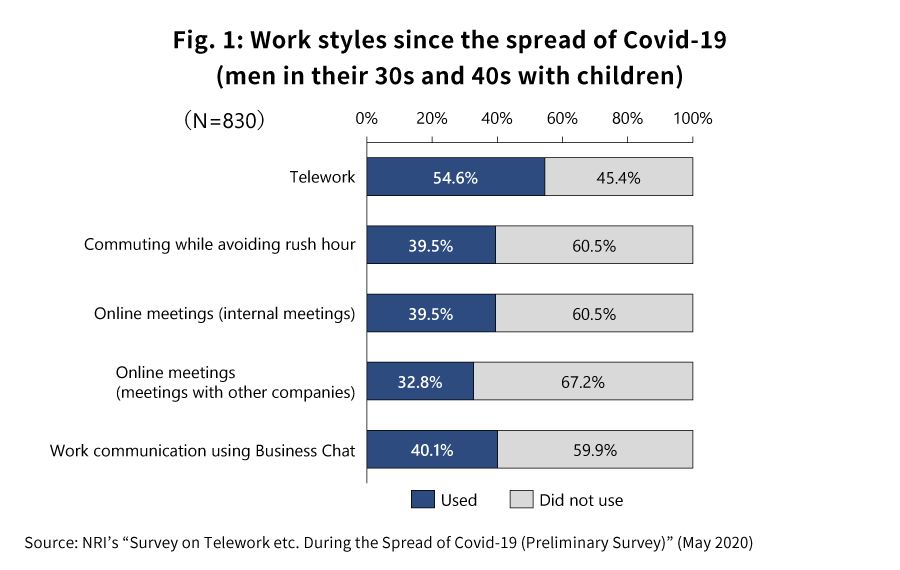
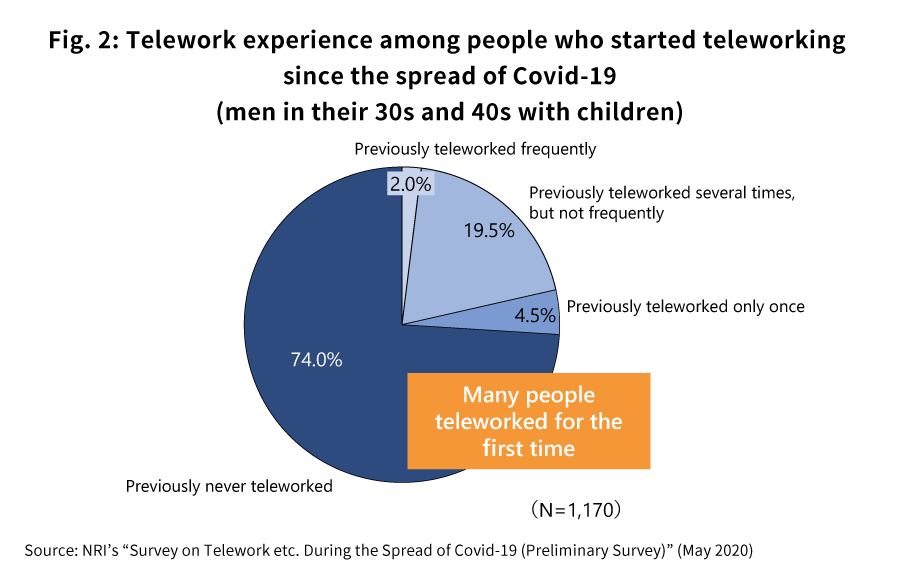
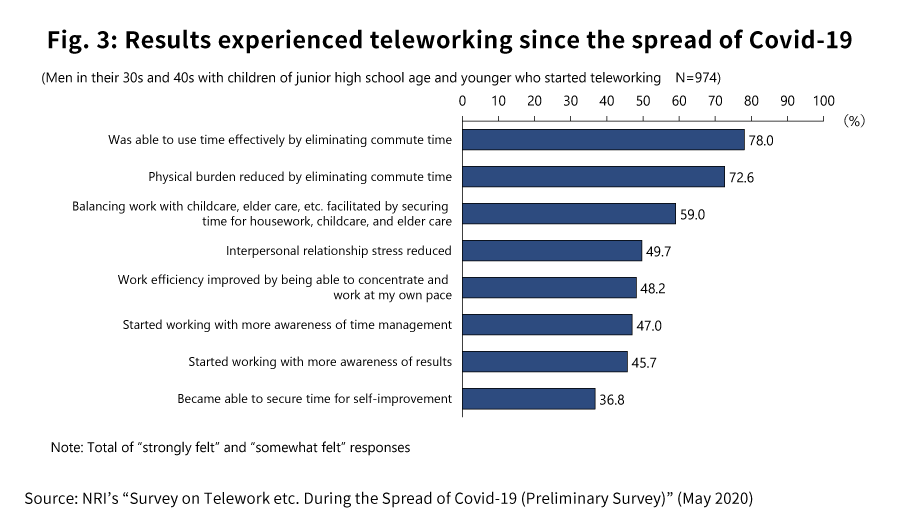
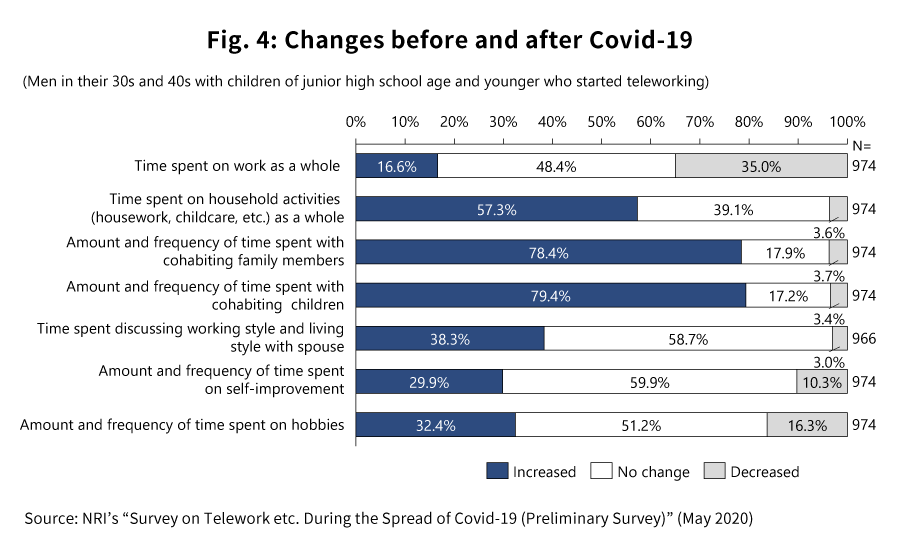
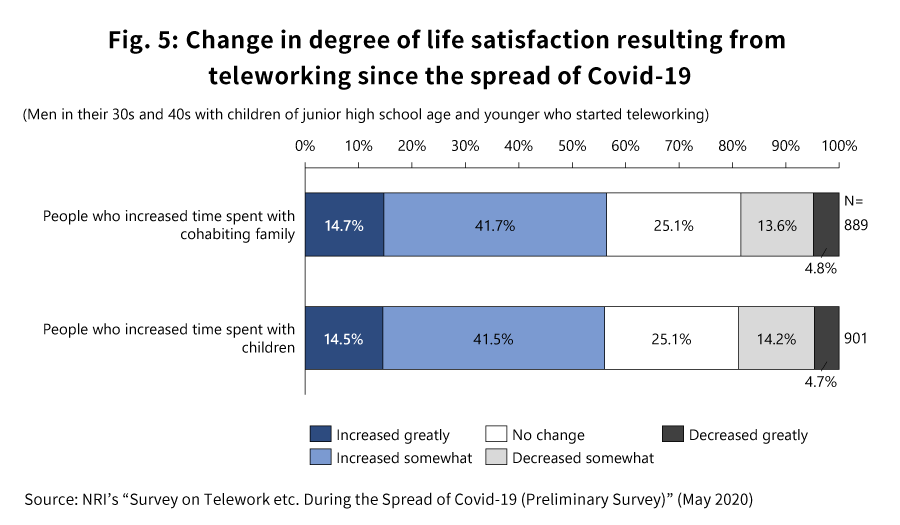
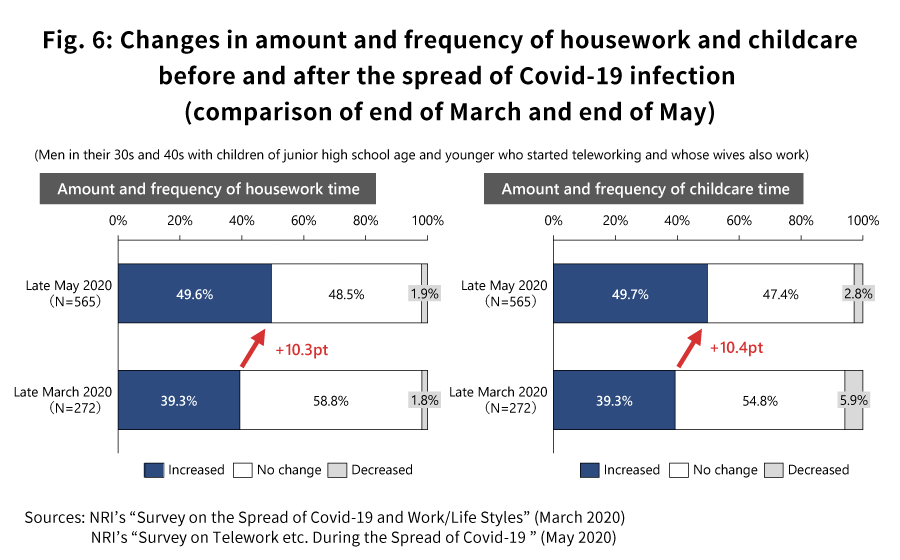
Author
Kana Takeda
Center for Strategic Management & Innovation
Nomura Research Institute
Contact Us
Media Inquiries:
-
Corporate Communication Department
Nomura Research Institute, Ltd.
TEL: +81-3-5877-7100
Inquiries about the proposals:
-
Center for Strategic Management & Innovation
Nomura Research Institute, Ltd.